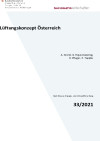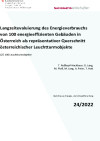Suchergebnisse
Lüftungskonzept Österreich

Ziel des Projektes ist die Schaffung eines Nachweisverfahrens (auf Basis Microsoft-Excel), welches zeigt, ob eine natürliche Lüftung bzw. Fensterlüftung bei einer Standardnutzung zur Vermeidung von Schimmelbildung ausreichend, bzw. in Hinblick auf eine ausreichende hygienische Luftqualität zumutbar ist.
Schriftenreihe
33/2021
A. Greml, G. Rojas-Kopeinig, R. Pfluger, P. Tappler
Herausgeber: BMK
Deutsch, 87 Seiten
Downloads zur Publikation
M-DAB2: Materialintensität der Innenentwicklung - Ressourcenbewertung und Lokalisierung städtischer Entwicklungspotenziale
Bei der Bewertung von Innenentwicklungspotenzialen wurde erstmals auch die Materialintensität der Innenentwicklung (anfallende Stoffmengen) für unterschiedliche Entwicklungsvarianten berücksichtigt. Dabei wurde ein Methodenset zur holistischen Bewertung von Potenzialflächen und verschiedene Entwicklungsvarianten und -szenarien zur ressourcenschonenden Innenentwicklung geschaffen.
REGOreal - 100% Erneuerbare Energie Region: Lokale Energie Gemeinwohl Oekonomie im Reallabor für vernetzte Energie- und Mobilitätszellen
In REGOreal geschieht die Sondierung für eine 100% Erneuerbare Energieregion im Raum Retz-Horn-Krems-Tulln (NÖ) sowie Mallnitz (Ktn). Es gibt vier Fokusthemen: 100 Erneuerbare Energie-Gemeinschaften (EEG), 1.000 Gebäudesanierungen, 10.000 Energie-Exporteure und -Exporteurinnen (im Sinne der Mitarbeiter:innen, welche den Ansatz ins private Umfeld tragen) und 100.000.000 km nachhaltiger Mobilität mit umfassender Nutzung von IT für die Entwicklung lokaler integrierter Energyiesysteme (IES) zur Einbindung eines bunten Mix unterschiedlicher Akteure und Akteurinnen und Objekte.
Regelungstechnik für die Hausheizung der Zukunft

Durch Optimierung der Regelung von Biomassefeuerungen können Schadstoffemissionen und Energieverluste erheblich reduziert werden. Ziel der Projekts ist daher zunächst die Analyse derartiger Einsparungsmöglichkeiten anhand des zeitlichen Verlaufs des Wärmebedarfs verschiedener "Häuser der Zukunft". Aufgrund der Ergebnisse dieser Analyse wird ein optimiertes Regelungssystem entwickelt und anhand einer Biomassefeuerung erprobt.
Passivhauskindergarten Ziersdorf Phase Errichtung
Errichtung eines Kindergartens in Passivhaus-Technik unter Verwendung von lokal verfügbaren Baustoffen mit der Vorgabe eines streng limitierten Kostenrahmens
Refurbishment of a housing complex to passive-house standard, Graz - Dieselweg
Refurbishment of the former "Puch-Siedlung", built as a housing area for employees of the company "Puch", in Graz Liebenau, in the period from the 1950s to 1970s, as an exemplary model for a refurbishment in "passive house standard" with special thoughtfulness to the tenants. "From domestic fuel to solar self sufficiency"
Innovative regulation of thermal solar collectors
Research and development of the possibility of a "sensorless" regulation for thermal solar systems
Monitoring of multi-family houses “Tonpfeifengasse”
Evaluation of activated building parts as heat storage for renewable energy shown on the example of the multi-family houses "Tonpfeifengasse".
Langzeitevaluierung des Energieverbrauchs von 100 energieeffizienten Gebäuden in Österreich als repräsentativer Querschnitt österreichischer Leuchtturmobjekte (LZE 100 Leuchtturmobjekte)

Erfassung, Auswertung und Analyse von Energieverbrauchsdaten von 100 energieeffizienten Gebäuden in Österreich über eine Betriebszeit von 3 bis 25 Jahren als repräsentativer Querschnitt der österreichischen Leuchtturmobjekte. Differenzierung nach Gebäudetypen, Energieträger und Ermittlung der realen Treibhausgas-Emissionen. Vergleich der gemessenen Verbräuche zu Benchmark-Werten.
Schriftenreihe
24/2022
T. Roßkopf-Nachbaur, G. Lang, M. Ploß, M. Lang, A. Peter, T. Hatt
Herausgeber: BMK
Deutsch, 143 Seiten
Downloads zur Publikation
ProKlim - Prognosegesteuerte Gebäudeklimatisierung
Energieeffizienzsteigerung in der automatisierten Gebäudeklimatisierung durch wetterprognoseunterstützte Regelung
e80^3-Buildings - Sub project 2: Concept development
Based on the selection of suitable demonstration projects in Subproject 1 an innovative concept for passive and active building envelopes and energy supply of so called "Plus Energy Buildings" (renovation) has been developed.
Serielle Sanierung für Häuser in Leichtbauweise
Die Sanierung von Ein- und Zweifamilienhäusern in Leichtbauweise in Österreich bietet ein großes Potenzial zur CO2-Einsparung. In diesem Forschungsprojekt wurde ein Sanierungskonzept auf Passiv- bzw. Plus-Energiehausstandard entwickelt, welches auf Serienfertigung abzielt und besonderes Augenmerk auf die Verwendung ökologischer Baustoffe legt.
Technical status of ventilation systems for buildings

Evaluation of existing ventilation systems in Austria considering technical quality and practicability.
Demonstrationsprojekt: Erste Passivhaus-Schulsanierung

Ganzheitliche Faktor 10 Generalsanierung der Hauptschule II und Polytechnischen Schule in Schwanenstadt mit vorgefertigten Holzwandelementen und Komfortlüftung
Mehrsprachig
LehB:klimafit! Live in existing buildings today: climate fit together
The aim of the project is to explore transferable renovation concepts for the implementation of climate-fit renovations in Vienna. Integrally optimized renovation packages will be developed, which will be optimized in the building ensembles for implementation-probable, climate-friendly overall solutions with the relevant stakeholders.
Forschungsinitiative "Zukunftssicheres Bauen" – Phase 3 (2019–2021)
Die vom Fachverband der Stein- und keramische Industrie initiierte Forschungsinitiative „Zukunftssicheres Bauen“ liefert – angelegt als Forschungskooperation von Industrie und Forschungseinrichtungen – wissenschaftliche Erkenntnisse für die Weiterentwicklung nachhaltiger Bauweisen. Die Ergebnisse aus den Projekten der Forschungskooperation werden regelmäßig mit der Fachöffentlichkeit geteilt. Die ÖGUT ist mit der wissenschaftlichen Begleitung der Initiative betraut und transferiert die Ergebnisse in das österreichische Energie- und Gebäudeforschungsprogramm „Stadt der Zukunft“ und auf die Plattform "Nachhaltig Wirtschaften".
ArcheNEO - Aktivbürohauskomplex in Kitzbühel Oberndorf
Im Projekt entstand ein Aktivbürohauskomplex mit höchster Energieeffizienz. Ein ganzheitliches Energiesystem mit Energieeinsparung, fluktuierenden erneuerbaren Energien in Kombination mit Elektromobilität und stationären Speichern zum Spitzenlastausgleich wurde konzeptioniert und in Kitzbühel Oberndorf gebaut und dient als Demonstrationsprojekt und als Multiplikator für den Export.
DALEC - Day- and Artificial Light with Energy Calculation
In the course of DALEC an online concept evaluation tool for architects, building engineers, lighting designers and building owners was developed. Although easy to use, the software accounts for the complex thermal and light processes in buildings and allows a simple evaluation of heating, cooling and electric lighting loads. Not only energy, but also user behavior were considered (e.g. in terms of glare protection) and visual and thermal comfort were evaluated. This novel and innovative, holistic approach makes sustainable and energy efficient building design possible for new buildings as well as refurbishment.
e-genius.at: Die Open-Content-Wissens- und Lernplattform
Im Rahmen des Projektes e-genius wurden digitale Unterrichtsmaterialien zu den Themen energieeffizientes Gebäude und erneuerbare Energien entwickelt und über die Plattform www.e-genius.at veröffentlicht. Die Arbeiten wurden im Juni 2012 abgeschlossen, sodass die Plattform seit Herbst allen Schulen und sonstigen Ausbildungsstätten zur Verfügung steht.
aspern Die Seestadt Wiens - nachhaltige Stadtentwicklung
Im Mittelpunkt des größten Stadtentwicklungsprojekts in Europa stehen die Themen Freiraum und Mikroklima sowie die gebäudeübergreifende Energieversorgung. Leuchtturmprojekte werden in den Bereichen Wohnen, Gewerbe und Mobilität entstehen.
